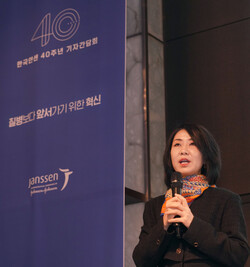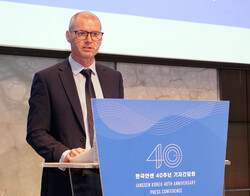Janssen Korea, committed to innovation to stay ahead of diseases, pledged growth through cooperation with various stakeholders during a press conference celebrating its 40th anniversary on Monday.
Established in 1983 as the Korean subsidiary of Johnson & Johnson's pharmaceutical division, Janssen Korea has supplied medicines in various therapeutic areas, including cardiovascular, metabolic, retinal diseases, immunological disorders, infectious diseases, neuropsychiatric conditions, and oncology.
The company is recognized as an innovative pharmaceutical company by the Ministry of Health and Welfare and plays a significant role in Korea's healthcare ecosystem.
During the conference, Cherry Huang, the Managing Director of Janssen Korea, introduced the company's achievements in key therapeutic areas such as cancer, autoimmune diseases, mental health, and pulmonary arterial hypertension.

"The past 40 years have been centered on a patient-focused corporate philosophy, managing previously untreated diseases, enhancing patients' quality of life, and introducing new mechanisms for better treatment outcomes through collaborations within an innovation ecosystem," Huang said. "Based on J&J's beliefs and philosophy, our culture of diversity and inclusiveness is the foundation of our mutual growth and value creation, offering opportunities and empowering our employees and society."
Huang added that she hoped to continue this legacy for another decade and even the next century.
Following her, Chris Hourigan, the Company Group Chairman, Pharmaceuticals, Janssen Asia Pacific, emphasized the importance of the Korean market in the innovation journey to address health challenges and stressed the need for collaboration with various partners.
According to Hourigan, Janssen has clinical operation teams in 30 countries globally, and Janssen Korea is designated as one of the 11 core countries responsible for early development under Janssen's global clinical operations organization.

"In Korea, the company conducts initial clinical trials involving over 6,000 patients across more than 600 medical institutions," Hourigan said. "Furthermore, we have expanded our clinical research team by 170 percent in 2023, enhancing Korea's contribution to global clinical research."
Janssen has pioneered a unique collaboration model with Korean society, leading growth in North Asia and being recognized by the Korean government as an innovative pharmaceutical company, he added.
Hourigan emphasized in the coming era of precision medicine, the company aims to radically transform patient care and disease management through deep collaborations with the Korean government, healthcare professionals, and industry partners.
In a subsequent panel discussion, Lee Jung-hee, Chairman of the Board of Directors of Yuhan Corp., Professor Lee Sang-yeol, President of the Korean College of Neuropsychopharmacology, Lee Young-shin, Korea Research-based Pharma Industry Association (KRPIA) CEO, John Yi, Managing Director of Janssen Vaccine, and Jung Hyung-jin, Janssen Korea Medical Affairs Head, presented examples of how Janssen Korea has been working to improve healthcare in Korea.
Notably, Lee Jung-hee spoke highly of Janssen Korea and stressed that Janssen's corporate values were one of the main reasons that Yuhan chose Janssen as a partner when licensing out Leclaza, its non-small cell lung cancer treatment.
In addition, Jung and Yi highlighted the importance of collaboration between various actors in the entire pharmaceutical industry cycle, from R&D, approval, and production to commercialization, disease awareness, and patient access, and introduced the Songdo Janssen Vaccines production facility and examples of domestic clinical studies of advanced medicines such as CAR-T and bi-antibody drugs.
"While the pharma bio-industry is a growth engine that will drive future economic growth and is a key strategic area for the country, it is an industry that requires investment and collaboration with a mid-to long-term perspective," KRPIA CEO Lee said. "We hope that Janssen's efforts in the Korean market through collaboration with various stakeholders will serve as a role model for the Korean bio ecosystem and pave the way for more innovation and collaboration in the industry."

